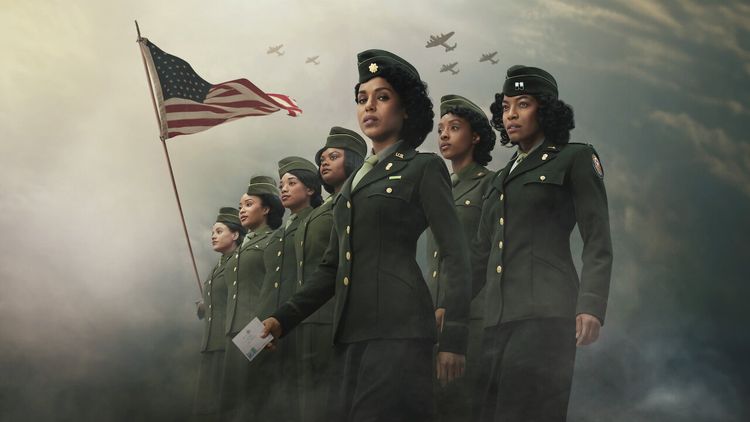'The Six Triple Eight' Is A Much-Needed Celebration Of Black ...

Tyler Perry’s portrayal of Black women has often been criticized. However, with his film “The Six Triple Eight,” he focuses on a group of overlooked women who played a crucial role in World War II. The film tells the story of the 6888th Central Postal Directory Battalion, an all-Black, all-female unit. Perry’s film sheds light on an important and underappreciated story at a time when Black history is experiencing marginalization.
The 6888th Central Postal Directory Battalion, under the leadership of Major Charity Adams (played by Kerry Washington), faced discrimination from their fellow Americans and the threat of a German attack. These women of the Women’s Army Corps were tasked with sorting a backlog of mail between American soldiers in Europe and their loved ones back home.
Black women, who endured harrowing working conditions, were instrumental in enabling white troops to effectively communicate with their families and vice versa. The film masterfully shows how these women helped raise the morale of the troops. Once again, a film illuminates a crucial aspect of American history that had languished for too long.
This is Perry’s best film, and the cast that helped bring these unknown heroines to light is equally great. With Oprah Winfrey and Susan Sarandon taking on the supporting roles of civil rights activist Mary McLeod Bethune and first lady Eleanor Roosevelt, respectively, this compelling true story marks an important milestone in Perry’s career.
Perry’s screenplay occasionally lacked depth, but Kerry Washington’s portrayal of Major Charity Adams elevated it.
“The Six Triple Eight” illustrates the hardships of war and the resulting despair felt by both soldiers and their families due to lack of communication, despite not featuring the large-scale battle scenes common in other World War II films. The film begins with a battle scene in Italy, setting the stage for the difficulties faced during this period of the conflict.
This plane crash leaves Abram David (Gregg Sulkin) unrecognizable, but a soldier finds a letter to his sweetheart in the States from the pilot’s jacket, transporting us to Lena Derriecott King (Ebony Obsidian). Lena is our entry point into a story with many characters and their motivations for joining the war. Abram, a Jewish boy, had proposed to his Black girlfriend Lena before leaving, a relationship met with disapproval in their 1940s small town, as highlighted by the racist remarks from their classmate Mary Kathryn (Sarah Helbringer).
Following the news of Abram’s passing, Lena decides to join the army. She finds boot camp challenging, yet it is insignificant compared to the treatment she and the other Black members of the Women’s Army Corps endure at the hands of the white servicemen. Reporters actively seek to expose the military’s acceptance of Black women into its ranks, while male colleagues display open disrespect, with Gen. Halt (Dean Norris) setting a contemptuous example at the top. This dynamic compels Adams, as commanding officer of the 6888th, to be even stricter. She knows there’s zero room for error.
While some women, like Lena, joined the 6888th Central Postal Directory Battalion for better opportunities, others had different motivations. Johnnie Mae (Shanice Williams), for example, enlisted to escape the cotton fields and to meet handsome soldiers. Unlike the reserved Lena, Johnnie Mae was outspoken and did not hesitate to point out that the army uniforms were not designed for curvy Black women.
After some back and forth, Adams and the 6888th battalion are finally given orders. They are tasked with sorting and delivering over 17 million pieces of mail within six months, a seemingly insurmountable task given their lack of resources, formal orders, and proper housing. The enormous undertaking is made even more challenging as the women must work out of 12 warehouses, each the size of a movie studio soundstage. Failure would not only jeopardize the battalion’s mission but also provide ammunition to those who believe women of color are incapable.
Washington’s powerful performance as Adams is a standout in this movie. She is supported by a stellar supporting cast. Perry has always been excellent at finding talent, and in the ensemble, there are plenty of standouts. Ebony Obsidian and Milauna Jackson deliver noteworthy performances as Lena Derriecott King and Captain Campbell, respectively. The film also effectively portrays the pervasive racism and disrespect faced by women, particularly in the context of the Armed Forces’ segregation prior to the Vietnam War. People often overlook the fact that Black service members frequently endured treatment worse than Nazi prisoners of war.
“The Six-Triple Eight” is a much-needed celebration of a group of women who served with dignity and valor, despite not having been celebrated until February 25, 2009. This film hopefully will encourage more to learn about these courageous women who have been inducted into the U.S. Army Women’s Foundation Hall of Fame.
The film debuted on Netflix on December 20.









































